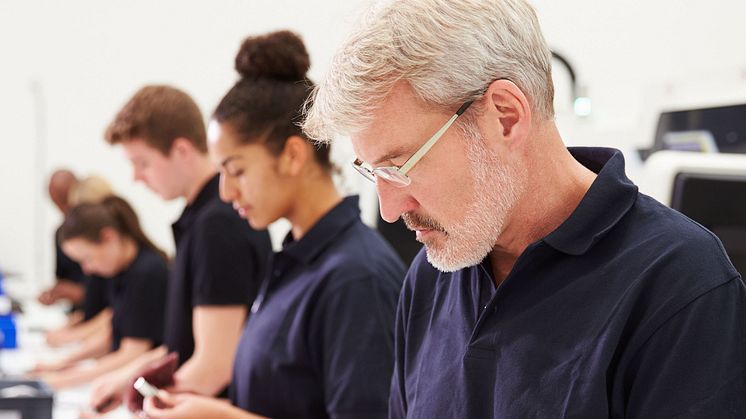
Blog post -
Europe’s slow-burning issue – making work sustainable
In this article, originally posted in Social Europe Journal, senior programme manager Greet Vermeylen highlights why making work sustainable is an important issue for Europe.
Making work sustainable is not simply a challenge for politicians and policymakers in the European Union: it is a fundamental issue that underpins the future of the world of work in Europe. It goes beyond the mantra of raising employment rates and deals with productivity and innovation – and the everyday lives of workers throughout the EU.
Sustainable work involves two main elements: first, ensuring that people in employment are able and willing to continue to work, and second, that throughout life, the situation and circumstances of workers are taken into account to enable them to enter, return, or stay part of working life – this involves having the time to engage in, say, private care activities and take care of health and employability issues throughout the course of one’s life.
The findings of the sixth European Working Conditions Survey (EWCS) help to map the situation of workers in Europe and uncover some truths which could enhance the sustainability of work for men and women.
The survey reveals stark differences between workers in Europe: more than one in four say they do not think they will be able to do their job or a similar one until 60, while one in five would like to continue to work as long as possible. This varies between countries: in Germany, Portugal, Denmark, and Finland more than four in five workers say that their work is sustainable, but fewer than three in five feel the same in France and Slovenia. Work and working conditions can play a positive role in keeping and building up health and well-being, skills and capacities. A preventative and proactive approach towards healthier and longer working lives and, where needed, ensuring that private needs (health issues, time issues, care responsibilities, employability) are taken care of, are therefore vital.
Working life can have an impact on health (whether immediate or delayed), as well as skills, motivation, and overall employability. Workers are, clearly, less likely to find work sustainable if they are exposed to physical risks, have high work intensity, do shift work or night work, fear losing their job; if they are subject to unfair treatment, or if they are exposed to bullying and harassment. Factors which make it more likely to respond positively to work being sustainable are being able to take an hour off to take care of private issues when needed, getting support from colleagues, having the perception of doing useful work, and getting recognition when doing a good job.
A key element to making work sustainable is being able to reconcile working life and private life. Throughout working life needs vary and different solutions can enhance work-life balance. For example, the care needs for small children are different than those for older children, or for other dependants such as sick partner and elderly parents. The sixth EWCS indicates that one worker in five feels that there is a bad fit between work and private commitments. This is more true of men than women, since women are more likely to adapt their work commitments to meet the demands they face in their private lives. This issue is most prevalent when there are children in the household. However, if we look at work done in the household sphere, so-called ‘unpaid work’, women continue to engage more in work here than men: both men and women increase their unpaid working hours when there are children but for women the number of unpaid working hours goes from 12 hours per week (without children) to 39 (with the youngest child under 7) and for men from 5 to 20 hours per week.
If we dig a bit deeper into work affecting private life, 14% of workers in the EWCS say that they regularly worry about their job when they are not working, 22% are often too tired to do the household jobs that need to be done after work, and 12% found that their job prevented them from having the time that they wanted with their family. Again, this is more often the case in families with children.
Leave arrangements such as maternity, paternity, parental and carers’ leave as well as care infrastructure and facilities such as crèches, afterschool care, residential care, and home care support can be vital in assisting workers with their care responsibilities. Workplace practices also play an important role in ensuring reconciliation between work and private life. A number of these can be identified that make work-life balance more difficult, including: working long hours, work during free time to meet work demands, night work, shift work and weekend work. On the other hand, people who work shorter hours, are able to take time off for private issues at short notice, are engaged in regular and predictable working hours, are able to work from home, and have some say over their working time report a better work-life balance.
Almost one worker in five (18%) in Europe has a long-standing illness or chronic disease. Sustainable work means an inclusive workplace that ensures that workers with health issues can return to work or can continue to work, and that those health issues are taken into account. So, if we are to ensure that workers can continue to work for longer, we must have strategies in place when workers are confronted with a health issue, particularly when we consider that one in four older workers report having chronic diseases.
If we want work to become more sustainable over a longer period for workers, and Europe to be equipped to deal with changes to the world of work in the coming years, both job quality and adaptation of work to individual needs and circumstances are of upmost importance. Concerted action, based on a coherent legislative framework, is needed if we are to increase the sustainability of work and improve the lives of workers across Europe.



